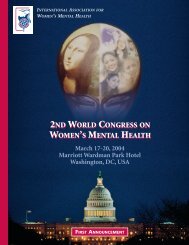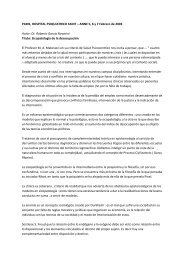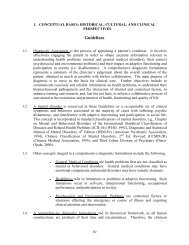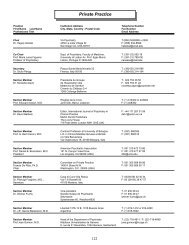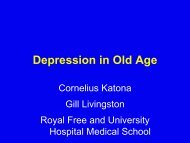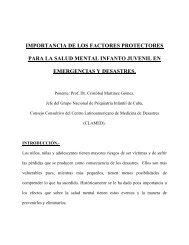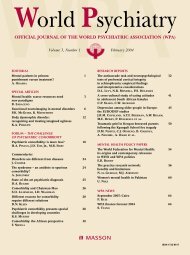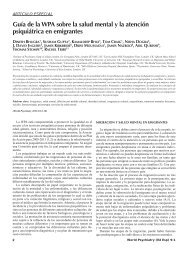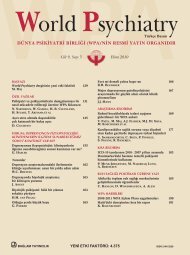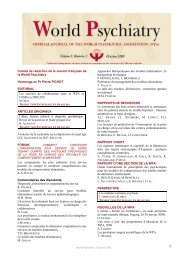ABSTRACTS - World Psychiatric Association
ABSTRACTS - World Psychiatric Association
ABSTRACTS - World Psychiatric Association
Create successful ePaper yourself
Turn your PDF publications into a flip-book with our unique Google optimized e-Paper software.
CS1.3.<br />
PSYCHIATRY AND THE PHARMACEUTICAL<br />
INDUSTRY: AN ETHICAL ISSUE<br />
S.A. Azim<br />
University of Cairo, Egypt<br />
The support given from the industry to prescribers, to researchers, for<br />
conferences/congresses and related activities, although quite helpful,<br />
still may influence the decisions of psychiatrists, which may sometimes<br />
be not in the benefit of their clients. This conflicting situation is<br />
usual nowadays, especially with the growing importance of pharmaceutical<br />
products. The shortage of support from the government and<br />
from other authorities to cover mental health activities and research<br />
in this domain in quite evident. Psychiatrists should be oriented to<br />
the ethical issues that arise in psychiatry’s relationship with industry.<br />
The support provided by the industry should be unrestricted and<br />
allowing more freedom and transparency. Some regulations can be<br />
established between the industry and psychiatric institutions.<br />
CS1.4.<br />
ETHICAL ISSUES RELATED TO PSYCHIATRIC<br />
TREATMENT IN DEVELOPING COUNTRIES<br />
J.K. Trivedi, M. Dhyani<br />
Department of Psychiatry, Medical University, Lucknow, India<br />
Ethics is derived from the Greek word “ethicos”, which means “rules<br />
of conduct that govern natural disposition in human beings”. It is the<br />
body of moral principles or values governing a particular culture or<br />
group. Ethics in psychiatry is always in a state of flux, adapting to<br />
changes in the specialty and its place in the world at large. The ethical<br />
issues that are relevant to the developing or low resource countries<br />
are in contrast to the industrialized countries. Issues such as<br />
euthanasia, surrogate motherhood, organ transplantation and gene<br />
therapy, which are on the forefront in the industrialized countries,<br />
are, for the moment, irrelevant in most developing countries. Ethical<br />
dilemmas associated with the allocations of limited resources are<br />
more important in the developing countries. Issues such as oppression<br />
and corruption, along with cross cultural research and activities<br />
of multinational companies, are relevant in developing countries. The<br />
majority of population in these areas is illiterate and unaware of their<br />
rights and is vulnerable to all sorts of allurements and or mistreatments.<br />
There is lack of consensus on these ethical issues and well<br />
defined ethical guidelines are needed.<br />
WPA SECTION WORKSHOPS<br />
SW1.<br />
NEUROPHYSIOLOGY IN PSYCHIATRY:<br />
STANDARDIZATION, TRAINING<br />
AND CERTIFICATION<br />
(organized by the WPA Section<br />
on Psychophysiology)<br />
S. Galderisi (Naples, Italy), N. Boutros (Detroit, MI, USA),<br />
M. Brunovsky (Prague, Czech Republic), H. Soliman (Cairo,<br />
Egypt), A. Mucci (Naples, Italy)<br />
Standard EEG and evoked potentials are useful tools in the diagnostic<br />
workup of patients with psychiatric or neurological disorders.<br />
However, most psychiatrists and sometimes even neurologists are not<br />
trained in electrophysiology and are not knowledgeable about its<br />
applications in the differential diagnosis of psychiatric disorders,<br />
monitoring of drug toxicity and neurofeedback. Contrary to the current<br />
trend to reduce training in electrophysiology, the core curriculum<br />
of psychiatrists should include education on the proper use of EEG in<br />
diagnosis and management of patients with psychiatric disorders and<br />
the acquisition of basic skills in qualitative and quantitative EEG and<br />
evoked potentials recording and interpretation. The WPA Section for<br />
Psychophysiology in Psychiatry started a discussion among world<br />
leaders in the field on the possibility to create homogeneous electrophysiology<br />
training for psychiatrists across the world. In this workshop,<br />
experts from various countries describe the present state of<br />
standardization of EEG and evoked potentials recording techniques<br />
and of training and certification procedures in their national contexts.<br />
Proposals for implementing homogeneous training programs and certification<br />
procedures are discussed.<br />
SW2.<br />
INTEGRATING RURAL MENTAL HEALTH<br />
WITH PRIMARY CARE IN DIVERSE CULTURES<br />
(organized by the WPA Section on Rural Mental<br />
Health)<br />
S. Rajkumar (North Richmond, Australia), F. Hughes<br />
(Porirua, New Zealand), T.A. Okasha (Cairo, Egypt), F. Kigozi<br />
(Kampala, Uganda), M.S. O’Brien (Lawrence, KS, USA),<br />
J.C. Anthony (East Lancing, MI, USA)<br />
This workshop focuses on sparsely populated remote regions where<br />
specialist services are minimal or nil. It covers different views of caring<br />
disciplines such as nursing, social work and psychiatry. The concepts<br />
and innovations have relevance to a vast population who are<br />
rural and remotely based globally. The overall aim is to enhance rural<br />
mental health and primary care in remotely based areas of the world<br />
and tease out replicable models that are cost effective and yet beneficial<br />
to the community.<br />
SW3.<br />
PREGNANCY RELATED PSYCHIATRIC PROBLEMS:<br />
SORTING THEM OUT AND ADDRESSING REAL<br />
ISSUES<br />
(organized by the WPA Section on Perinatal<br />
Psychiatry and Infant Mental Health)<br />
G. Apter-Danon (Antony, France), N.L. Stotland (Chicago,<br />
IL, USA), G. Robinson (Toronto, Canada),<br />
N. Garret-Gloanec (Nantes, France), C. Nadelson<br />
(Boston, MA, USA)<br />
In the last years a number of studies have focused on psychiatric disorders<br />
linked to reproductive issues. Pregnancy termination and<br />
abortion have been linked to consequent mood and anxiety disorders<br />
and eventually post-traumatic stress disorder. Past history of abuse<br />
and trauma, as well as of depression, in women’s lives and its association<br />
to depression in pregnancy, however, often goes neglected.<br />
Abortion and its supposed psychiatric consequences have been subject<br />
to heated debate often confounding examination of scientific<br />
facts. On the other hand, the myth of pregnancy as a blessed period,<br />
free of psychiatric disorders, is still strong though continuously<br />
proved wrong whether it be for women with bipolar or major depressive<br />
disorder. Recognition and assessment of symptoms during the<br />
peri-partum is still insufficient. Links to past maternal history are not<br />
117



